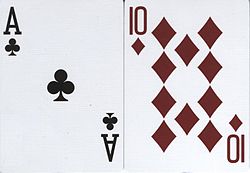All too often these days we read or hear in the news, “[Name of politician] doubled down on his earlier remarks…”
So what does it mean to “double down”?
The term comes from the world of gambling, specifically from the game of Blackjack (AKA “Twenty-one”). The object of the game is to draw cards so that their combined value is a) equal to or less than 21, and b) higher than the dealer’s hand (such that the dealer’s hand is also less than 21). Spot cards 2-10 have values equal to their nominal values; face cards are all valued at 10, and aces can be either one or eleven, at the player’s discretion. The players are dealt two cards, generally both face up; the dealer initially gets two cards, one face down and the other face up. After all the players draw the cards they desire, the dealer reveals his or her down card, and must draw cards according to a strict set of rules (which may vary from casino to casino).
The full rules of blackjack are available many places.
So, what is “doubling down”?
Doubling down is this: after you have already seen your hand, and you know the dealer’s visible card, you may double your bet in return for drawing one, and only one, additional card. No matter what that card is, you must stand with the hand you have at that point. You have the chance to make some serious money by doubling your bet, with a lot more information in your possession than you had just a moment before
So when should you double down?
If you’re counting cards, follow your system. If you aren’t counting cards (and why aren’t you?):
Consider two cases, one a hard hand (i.e. it doesn’t have an ace) or a soft hand (it does have an ace):
Hard hands:
Hard eleven (e.g. seven and four), regardless of what the dealer is showing, double down.
Hard ten, (e.g. eight and two), and the dealer is showing a 4, 5, or 6, double down.
Hard nine (e.g. six and three), and the dealer is showing a 5 or 6, double down.
Soft hands:
If you have an ace and an 8 or higher, do not double down.
If you have an ace and a 2, 3, 4, 5, 6, or 7, then:
If the dealer is showing a 2, or the dealer is showing a 7 or higher, do not double down.
If the dealer is showing a 5 or 6, then double down.
If the dealer is showing a 3 or 4, and the sum of your non-ace card plus the dealer’s up card is nine or less, then double down.
Don’t play hunches. Follow the math. Quit while you’re ahead. And know the house rules.
So why do we talk about politicians “doubling down”? It’s an imperfect metaphor. Perhaps because doubling down is something that beginners know is possible, but if it’s done unwisely they can lose a lot of money in a hurry.

Reblogged this on Dr. Doyle's Blog and commented:
Over on his blog, Jim Macdonald talks about cards and metaphors.